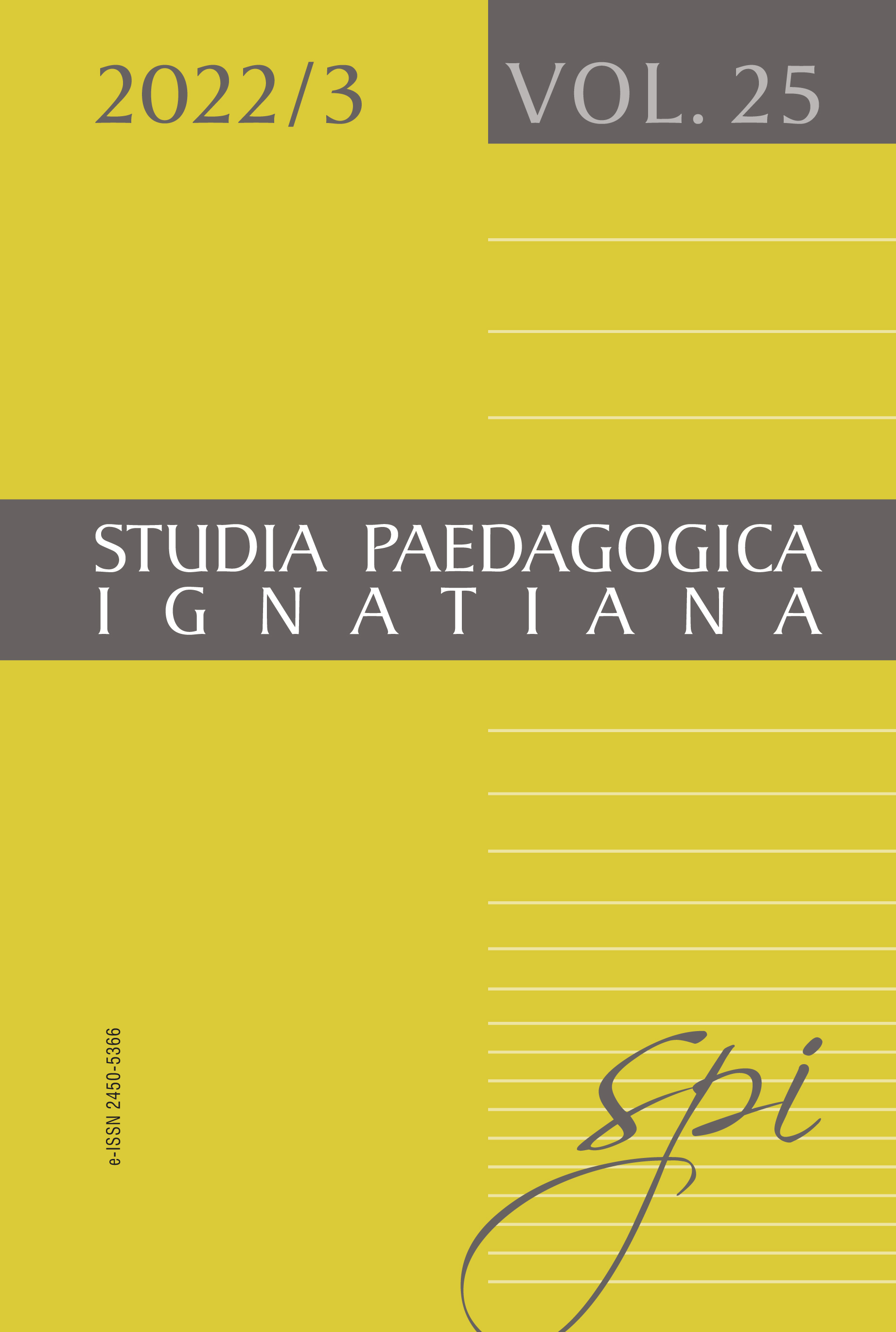Wytwarzanie czy ulepszanie świata i człowieka? Pytanie o etyczne podstawy wychowania
DOI:
https://doi.org/10.12775/SPI.2022.3.002Słowa kluczowe
totalitaryzmy, transhumanizm, nadczłowiek, postczłowiek, edukacja, praxis, poiesisAbstrakt
W artykule postawiono pytanie o etyczne podstawy wychowania. Odwołano się do Arystotelesowskiego odróżnienia poiesis i praxis. Wskazano poważne trudności pojawiające się, gdy to odróżnienie zostaje zakwestionowane. Zanalizowano kulturowy, etyczny i edukacyjny kontekst pojawiania się koncepcji kwestionujących istotność odróżnienia wytwarzania i ulepszania.
Punktem wyjścia rozważań uczyniono klasyczną koncepcję prawa naturalnego i związane z nią pytanie o „rzeczy pierwsze”. Odróżnienie praxis i poiesis odniesiono do dwóch rodzajów celów. Następnie zanalizowano wybrane pojęcia istotne w kontekście proponowanych rozważań.
Jako pierwsze przywołane zostało pojęcie postępu. Zaproponowano – za Robertem Spaemannem – klasyfikację rodzajów postępu. Pokazano związek postępu typu A, rozumianego jako wytwarzanie, z ideologiami i totalitaryzmami. Wskazano – za Erikiem Voegelinem – na gnostyckie źródła dwudziestowiecznych ruchów intelektualnych i ruchów masowych. Interpretacje modernizmu, proponowane przez powyższych autorów, uzupełniono o rozważania Chantal Delsol. Wykorzystano zaproponowane przez nią metaforyczne odróżnienie dwóch rodzajów stosunku do świata. Przywołano figury „ogrodnika” i „demiurga”.
Jako egzemplifikację demiurgicznego nastawienia przedstawiono transhumanizm. Podjęto polemikę z zarzutami zwolenników transhumanizmu w stosunku do pedagogiki. Wskazano, że wychowanie musi uwzględniać wolność wychowanka i dlatego nie może być rozumiane jako poiesis.
Bibliografia
Arystoteles (1996). Metafizyka, t. 1 i 2, przeł. M. Krąpiec, A. Maryniarczyk, Lublin: Redakcja Wydawnictw KUL.
Arendt H. (1994). Między czasem minionym a przyszłym. Osiem ćwiczeń z myśli politycznej, przeł. M. Godyń, W. Madej, Warszawa: Fundacja Aletheia.
Bielicki T. (1997). Pojęcie natury ludzkiej w świetle biologicznej teorii zachowań społecznych, [w:] J. Reykowski, T. Bielicki (red.), Dylematy współczesnej cywilizacji a natura człowieka, Poznań: Wydawnictwo Zysk i S-ka, s. 9–24.
Bloom A. (1997). Umysł zamknięty. O tym, jak amerykańskie szkolnictwo wyższe zawiodło demokrację i zubożyło dusze dzisiejszych studentów, przeł. T. Bieroń, Poznań: Wydawnictwo Zysk i S-ka.
Courtois S. i in. (1999). Czarna księga komunizmu. Zbrodnie, terror, prześladowania, przeł. K. Wakar i in., Warszawa: Prószyński i S-ka.
Delsol Ch. (2017). Nienawiść do świata. Totalitaryzmy i ponowoczesność, przeł. M. Chojnacki, Warszawa: Instytut Wydawniczy Pax.
Hessen S. (1997). Podstawy pedagogiki, przeł. A. Zieleńczyk, Warszawa: Wydawnictwo Akademickie „Żak”.
Holmes S. (1998). Anatomia antyliberalizmu, przeł. J. Szacki, Warszawa–Kraków: Fundacja im. Stefana Batorego; Znak.
Klichowski M. (2014). Narodziny cyborgizacji. Nowa eugenika, transhumanizm i zmierzch edukacji, Poznań: Wydawnictwo Naukowe UAM.
Rutkowski J. (2021). Ogrodnicy i demiurdzy. O dwóch rodzajach relacji ze światem, „Paedagogia Christiana”. t. 48, nr 2, s. 11–23.
Spaemann R. (1999). Ten, który powstrzymuje – i ostatni bój, przeł. X. Dolińska, [w:] K. Michalski (red.), Koniec tysiąclecia. O czasie i drogach nowożytności, Kraków: Znak, s. 66–82.
Strauss L. (1969). Prawo naturalne w świetle historii, przeł. T. Górski, Warszawa: Instytut Wydawniczy Pax.
Strauss L. (2005). Czym jest edukacja liberalna?, przeł. W. Dąbrowski, „Przegląd Filozoficzny – Nowa Seria”, nr 1(53), s. 217–223.
Strauss L. (2007). Trzy fale nowożytności, przeł. W. Madej, „Przegląd Polityczny”, nr 84, s. I–II.
Voegelin E. (1994). Lud Boży, wstęp i tłum. M. Umińska, Kraków: Znak.
Voegelin E. (1998). Gnostyckie ruchy masowe naszych czasów, przeł. D. Leszczyński, L. Rasiński, „Odra”, nr 11, s. 35–43.
Voegelin E. (2011). Od Oświecenia do rewolucji, przeł. Ł. Pawłowski, wstęp P. Śpiewak, Warszawa: Wydawnictwa Uniwersytetu Warszawskiego.
Netografia
Bostrom N. (2003). The Transhumanist FAQ: A General Introduction, https://nickbostrom.com/ [dostęp: 29.05.2022].
More M. (2022). The Philosophy of Transhumanism, https://www.humanityplus.org/philsophy-of-transhumanism [dostęp: 25.05.2022].
Pobrania
Opublikowane
Jak cytować
Numer
Dział
Licencja
Prawa autorskie (c) 2022 Jan Rutkowski

Utwór dostępny jest na licencji Creative Commons Uznanie autorstwa – Bez utworów zależnych 4.0 Międzynarodowe.
Autor zgłaszając swój artykuł oświadcza, że:
jest Autorem artykułu (zwanego dalej Utworem) i:
- przysługują mu wyłączne i nieograniczone prawa autorskie do Utworu,
- jest uprawniony/a do rozporządzania prawami autorskimi do Utworu.
Udziela Uniwersytetowi Ignatianum w Krakowie nieodpłatnej, niewyłącznej, nieograniczonej terytorialnie licencji do korzystania z Utworu na następujących polach eksploatacji:
- utrwalania utworu w formie papierowej, a także na nośniku cyfrowym lub magnetycznym;
- zwielokrotnienia utworu dowolną techniką, bez ograniczenia ilości wydań i liczby egzemplarzy;
- rozpowszechniania utworu i jego zwielokrotnionych egzemplarzy na jakimkolwiek nośniku, w tym wprowadzenia do obrotu, sprzedaży, użyczenia, najmu;
- wprowadzenia utworu do pamięci komputera;
- rozpowszechniania utworu w sieciach informatycznych, w tym w sieci Internet;
- publicznego wykonania, wystawienia, wyświetlenia, odtworzenia oraz nadawania i reemitowania, a także publicznego udostępniania utworu w taki sposób, aby każdy mógł mieć do niego dostęp w miejscu i czasie przez siebie wybranym;
- w zakresie praw zależnych do Utworu, obejmujących w szczególności prawo do dokonania koniecznych zmian w Utworze, wynikających z opracowania redakcyjnego i metodycznego, a także do dokonania tłumaczenia Utworu na języki obce.
Udzielenie licencji następuje z chwilą przekazania Utworu na rzecz Uniwersytetowi Ignatianum w Krakowie. Uniwersytet Ignatianum w Krakowie jest uprawniony do udzielania dalszych sublicencji do Utworu, w zakresie udzielonego prawa. Licencja jest ograniczona czasowo i zostaje udzielona na okres 15 lat, licząc od daty jej udzielenia.
Polityka prywatności
Statystyki
Liczba wyświetleń i pobrań: 605
Liczba cytowań: 0



